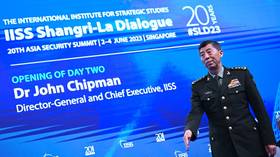Fyodor Lukyanov: Why Asia is much more interesting than Europe as a laboratory for the multipolar world
Regional powers in the East are far less willing to trade their sovereignty compared to those on “the old continent”

Last week, Singapore hosted the annual Asian Shangri-La Dialogue security conference. It has been organized for over 20 years by the London-based International Institute for Strategic Studies.
It’s probably the most representative forum in the region, even though the agenda is set by Westerners. It’s also arguably still the most accurate indicator of the general Asian mood and is now beginning to dictate the general global atmosphere.
There were a couple of landmark events at the 2023 edition. Perhaps the most interesting was Chinese Defence Minister Li Shangfu’s refusal to meet Pentagon chief Lloyd Austin on the margins. The démarche was quite clear, although both ministers’ speeches expressed the unacceptability of confrontation, the consequences of which could be catastrophic.
Washington and Beijing have opposing visions in their assessment of future possibilities. In the US, there is a clear and almost unanimous view that Beijing is a rival that must be reined in at almost any cost. And those that shape opinion believe it will get worse.
China is outraged that the US itself is dismantling a system of relations that has enriched both sides to their mutual satisfaction for decades. In Beijing's view, the Americans are overstepping the bounds of reason by demanding that their Asian partners submit to their interests – or even whims. From Washington’s point of view, allowing China to continue to rise means having a challenger for world domination in the near future, with whom a clash is inevitable. Not a good position to be in.
Thus, the paradox is that while both sides are openly preparing for confrontation, they are very wary of it.
Neither side is confident of imminent success. Logically, China’s primary interest is to postpone the moment of conflict as long as possible, if it is to be seen as inevitable. After all, Beijing has always been a catch-up actor, and on the military side it has much less experience than the Americans. The latter, on the other hand, may assume that the sooner the relationship is clarified, the better their chances of success.
Of course, the US is now involved in a confrontation with Russia in Ukraine, and the prospect of a second front in Asia is worrying. This would not necessarily be a direct military engagement (no one believes this is likely in the short term), but a general increase in politico-military tensions, draining resources in that direction.
The recent dangerous proximity of warships in the South China Sea is a familiar sight to the various Baltic and Black Sea confrontations. At the same time, diplomatic and intelligence contacts are taking place to “keep the lines of communication open.” However, these are much less busy than in the recent past.
The whole of Asia is watching closely the twists and turns in the relationship between the two superpowers, which cannot do without each other – but are no longer getting along. Ideally, big and ambitious countries would like to avoid making a choice between the pair as many Shangri-La participants discussed, but the choice is asymmetrical.
The US expects a certain degree of alliance, i.e. binding security relationships from its partners. China does not usually insist on this, since it doesn’t like to make formal commitments and doesn’t demand them from others. However, it does expect its neighbors not to participate in unfriendly formats and to be willing to engage in free economic cooperation. Until recently, the countries of the region had no doubts – the Chinese model of relations was optimal because it implies greater flexibility and does not require confrontation with the US. But now flexibility itself is seen by the American side as disloyalty, and with corresponding consequences.
There is another aspect to the context of growing competition between the two great powers – other countries feel that their own importance is growing. For them, competition is raging. While in Europe, no pendulum swings are possible because Washington deems them unacceptable, this will not be the case in Asia. Even countries allied to the US bloc – such as Japan and South Korea, not to mention Australia – have not completely abandoned hedging.
Firstly, the degree of economic interdependence with China is enormous for all countries in the region. Secondly, everyone understands that the intensity of the confrontation will be determined not only by the importance of what is immediately at stake, but also by resolving the fundamental question of who will be the leading power in determining the future rules of the game.
In this context, maintaining full sovereignty and not becoming geopolitically dependent on others is of paramount importance. The large and actively developing countries of Asia and the Pacific take every opportunity to demonstrate their own autonomy and their ability to make decisions based solely on their own interests. Indonesia’s peace plan for the Ukraine conflict, which has few real prospects, is a case in point. Jakarta, like a number of other capitals, needs to emphasize that it has a unique outlook on global events. The world of tomorrow, whatever it may be, will be a collection of such original perspectives, the harmonization of which will be the essence of international politics.
In this sense, Asia is a much more exemplary laboratory than Europe.
https://www.rt.com/news/577793-laboratory-for-the-multipolar-world/



0 Comments:
Post a Comment
Subscribe to Post Comments [Atom]
<< Home